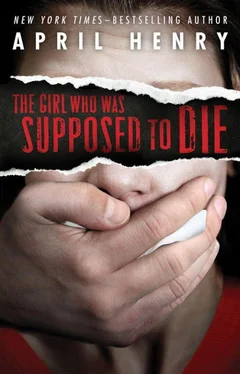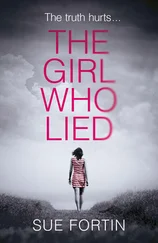“I’ve got a picture of us, but I really don’t remember them.” My left temple is starting to throb.
She turns to Ty. “And, Ty, forgive me for asking, but how long have you known Cady?”
“I just met her last night. I could see she was in trouble, and I wanted to help her.” He looks down at his shoes and then back up at Liz. In this room, with its formal, dark red wallpaper, he looks young and uncertain.
“Well, you’ve brought her to the right place.” She rests her hand on my shoulder as if to show we’re a team. “She’s in good hands now.”
I realize she’s hinting that Ty should go. And maybe he should. But I don’t want him to leave me with this woman I’m only starting to remember. Right now, Ty feels like my one friend in the world.
“Thanks, Liz.” He says the words easily, but I can tell he’s not going to budge. “I think I’ll come along for the ride.”
“I’m not sure that’s such a good idea.” She shakes her head, setting her earrings in motion. “This is dangerous. Very dangerous. You don’t want to get mixed up in it.”
“I’m not going anywhere,” Ty says. “Not until Cady is okay.”
“What’s dangerous?” I ask, massaging my temple. “What’s going on? All I know is my family’s missing and everyone but you seems to think I had something to do with it. But you said on the radio you were sure I didn’t. How do you know?”
“Because your mom called me yesterday morning. She said she was on the run with your dad and Max, and asked me to help you. That’s why I came to Portland. Holding the press conference was the only way I could think to reach out to you.”
“So you talked to my mom?” I raise my head. Tears spark my eyes. “She’s alive?”
“Janie and Patrick and Max are all okay.” Liz bites her lip. “Or at least they were yesterday when Janie left me that message. She told me they were ditching their cell phones, so now I don’t have any way to contact them. That’s where I could use your help.”
“My help? I can’t even remember them.”
“I think if we all put our pieces of the puzzle together, we can figure this thing out. Here, sit down and I’ll try to explain.” Liz sits on the edge of the bed, which is covered with a white duvet and tons of white pillows. Ty takes the chair that’s in front of a small desk, turns it around, and straddles it. I sit in a maroon-striped wingback chair.
“First,” Liz says, “tell me what you do know. Don’t leave out anything, no matter how unimportant it seems.”
So I tell her what we know and what we’ve been able to find out and what we’ve guessed. But there are a few parts I find myself glossing over. I don’t tell her about the gun in my backpack or about how Michael Brenner died after I knocked him unconscious. If my aunt knew, would her opinion of me change? Would she still be so certain that I was in the right?
“Let me start by filling in the blanks,” she says when I’m finished. “Maybe it will help you remember. Your parents work for a company called Z-Biotech. Does that sound familiar?”
It does! I straighten up, convinced that my memory is finally returning. And then—“I heard it on the news when we were driving here.”
“And do you know what your parents do?”
“The radio said something about them being microbiologists.”
“Your parents are actually virologists. That means they work with viruses. To be honest, I don’t completely understand exactly what they do. Hardly anyone does. But they’re brilliant researchers.” She sighs theatrically. “I took some science courses in college, but obviously my sister’s the one who got the real brains in the family. Anyway, two years ago, in some remote part of Eastern Oregon, a girl who lived on a farm died. She was only nineteen. And then on the way to her funeral, her boyfriend got sick. Very sick. He ended up dying on the side of the road before the ambulance even showed up.”
She takes a deep breath. “The autopsy report said he basically drowned in his own blood.”
DAY 2, 5:22 P.M.
My aunt watches my face intently. “Do you remember any of this so far?”
A disease that causes people to drown in their own blood? I shake my head. I don’t. At least, I don’t think I do. It’s too hard to describe what I’m beginning to feel. Like trying to recall a dream a week after you have it. You’ve completely forgotten about it, and then the flash of a bird’s wing or walking down a metal staircase conjures up part of your dream, bringing it into the real world. But only a few seconds feel sharp. The rest is still gone, and the more you try to remember, the less you succeed.
“Your parents were the ones who figured out it was a new strain of hantavirus that’s being spread by field mice.” She looks at me closely. “Does that sound familiar? Hantavirus?”
Slowly, I shake my head. Familiar isn’t the word for what I’m feeling. It’s more like dread.
“So the mice were biting people?” Ty asks.
“No,” Liz says. “According to Janie, basically all a field mouse does is eat, poop, and have babies. And give hantavirus to each other when they mate or fight. Two years ago it rained a lot, which led to a huge wheat crop, which eventually led to an explosion in the field mice population. When it got hot, their droppings dried up. And then in barns and farms around Eastern Oregon, those powdery droppings got kicked up and inhaled. Eight people had the bad luck to breathe in those tiny particles, which carried hantavirus. Those people died.”
“All of them?” Ty asks.
Liz sighs. “All of them. It’s the most deadly strain of hantavirus ever discovered. It doesn’t kill its hosts—the field mice—but it does kill humans.” She turns to me. “It was your parents who figured it out. One person dying in one county, another in the next—it got misdiagnosed as pneumonia or the flu. But your parents had a hunch and began testing rodents in Eastern Oregon—the voles, the ground squirrels, the field mice—and figured out it was really a new strain of hantavirus.”
“So?” Ty leans forward. “What does a disease carried by field mice have to do with men wanting to kill Cady?”
“Because her parents have also figured out the other half.” Holding her hands facing each other, Liz links her fingers together, then looks at me over her interlaced fingers. “For the past year, your parents have been working on a vaccine for the new strain.”
“But a vaccine’s a good thing, isn’t it?” I say. Then why do I feel so bad?
“Some vaccines do more than just keep you from catching a disease. Some also stop the virus in people who have already been exposed, but haven’t gotten sick yet.”
“That’s how it works with rabies,” Ty says. “And tetanus. If you give the shots to people soon enough after they’ve been bitten by a rabid animal or stepped on a rusty nail, they don’t get sick.”
“Right,” Liz says, but her blue eyes never leave mine. “Last year, Z-Biotech was sold. The new owners weren’t scientists, but Janie said they were fascinated with the idea that a vaccine could work even after exposure. They ordered your parents not to talk about the vaccine results, although it was working perfectly in animals. They said they didn’t want to lose their market advantage.” Her mouth twists. “Janie and Patrick are smart, but they live in their own little world. They didn’t see that having both things—a devastating disease and the cure to that disease—could mean the makings of a weapon.”
“A weapon?” Things are taking a turn I never imagined. “You mean like in war?” When Liz nods, I say, “But aren’t those kinds of weapons illegal?” Her words are setting off echoes. Something about this conversation feels so familiar.
Читать дальше












